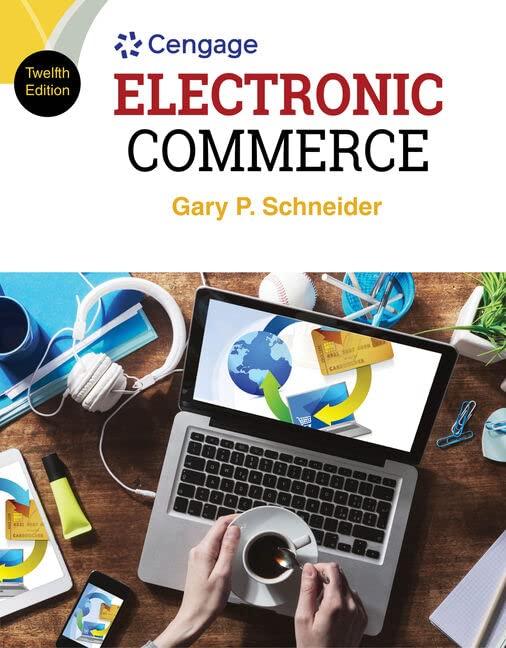Bill Gross started his first company (a solar-powered device manufacturer) when he was 15 years old. After
Question:
Bill Gross started his first company (a solar-powered device manufacturer) when he was 15 years old. After graduating from Caltech, he started an audio equipment manufacturer that was sold to Lotus and an educational software company that was sold to Cendant. With the proceeds of those sales, he decided to act on his fascination with the idea of converting ideas into profitable businesses and the business potential of the Web and, in 1996, joined with several partners to create Idealab.
Idealab was one of the first companies to provide an incubator that was open to individual entrepreneurs. Idealab provided venture capital and gave entrepreneurs a place to work and develop their business ideas alongside other entrepreneurs. In the first wave of electronic commerce, Idealab was very successful. Although many of its incubated companies eventually failed, enough of them succeeded that Idealab was able to fund several generations of new businesses through its operations. In its first year, it supported 10 new businesses, including the very successful CitySearch Web site. In its second year, Idealab helped create another 10 businesses, including the successful sites Shopping.com, Tickets.com, and Wedding Channel .com. In subsequent years, Idealab incubated companies such as NetZero, Cooking.com, CarsDirect.com, Picasa, and GoTo.com (which later became Overture and was eventually acquired by Yahoo!). Not all of Idealab’s companies were successful, however. One of the most dramatic failures of the first wave of electronic commerce, eToys, had been an Idealab company. Idealab had more winners than losers, though; by early 2000, the company had more than $4 billion in assets.
In 2000, Gross decided to go beyond Idealab’s original purpose as an incubator and developed a plan to compete with Amazon using existing Idealab companies. His plan was to combine about 10 of the companies in the incubator (including specialty retailer Eve.com and online jewelry store Ice.com) and promote them (using large amounts of money that would be raised from outside investors) as a single marketplace under the name Big.com. However, just as Gross began raising money to support the launch of this new marketplace, the pool of dot-com investment funds dried up. The new combined company failed. Eve.com and Big.com no longer exist. The founders of Ice.com bought their company back from Idealab and moved it to their home in Montreal (where the company is now operating profitably).
Within a few months, the failure of Big.com and a decline in the market value of Idealab’s other holdings cut the company’s asset value from $4 billion to $200 million. In January 2002, 44 Idealab investors sued Gross and other Idealab managers for $750 million, alleging mismanagement of funds. Eighteen months later, the suit was dismissed and Gross was once again able to devote his time to operating Idealab as an incubator; however, Idealab laid off more than two-thirds of its employees and stopped accepting outside venture capital. Idealab stopped providing incubator space for entrepreneurs who had developed ideas on their own and started funding only ideas generated by the Idealab management team. In 2012, Idealab returned once again to funding outside entrepreneurs and has returned to incubating successful ideas, such as New Matter, a company that makes low-cost 3D printers.
In 2014, Gross launched IdeaMarket, a crowdsourced marketplace that matches ideas with entrepreneurs who might be able to turn them into businesses and investors who can finance the startup. Anyone with an idea for which they have neither the skills nor the resources to develop themselves can post it on IdeaMarket. The people proposing the idea can invest some of their own money in the project if they wish, but most of the funding is provided by other investors who have been approved by Idea Market. Entrepreneurs who are interested in developing the idea into a business can submit a plan for doing so. Visitors to the Web site can suggest improvements to the business plan and can vote for or against it. The plans are eventually reviewed by the investors or IdeaMarket to reach a decision on whether to move forward or not. The person with the idea gets a 5 to 20 percent interest in the new venture (depending on how much money they invest, if any), site visitors who contribute to the plan share in a pooled interest of 5 percent, IdeaMarket gets 5 percent, and the rest is given to the team of entrepreneurs and the main investors.
REQUIRED:
1. Bill Gross, in a widely viewed TED Talk, made the point that the most important key to success when introducing a new product or service is timing. In about 200 words, analyze Idealab’s 2000 decision to change its focus from being an incubator to merging its companies in an attempt to compete with Amazon.com. In your analysis, discuss whether the decision was a strategic error or just a case of bad timing.
2. In about 200 words, explain why you think Gross decided to reverse his decision to develop only internally generated ideas. Be sure to consider whether this change will help Idealab succeed in the third wave of electronic commerce.
3. In 2009, a company, Quirky, was launched that used crowdsourcing to evaluate ideas submitted by inventors. Quirky would fund the development of the most popular product ideas that it decided were feasible to create and sell profitably and shared the profits with the inventors. Despite some successful products, the company closed in 2015. Using your favorite search engine or the resources of your library to learn more about Quirky, write a report of about 500 words in which you compare Quirky to IdeaMarket. In your report, evaluate the revenue models of the two companies, identify reasons for Quirky’s failures, and comment on the likelihood that IdeaMarket will be able to avoid a similar fate based on your comparison and analysis.
Step by Step Answer:






